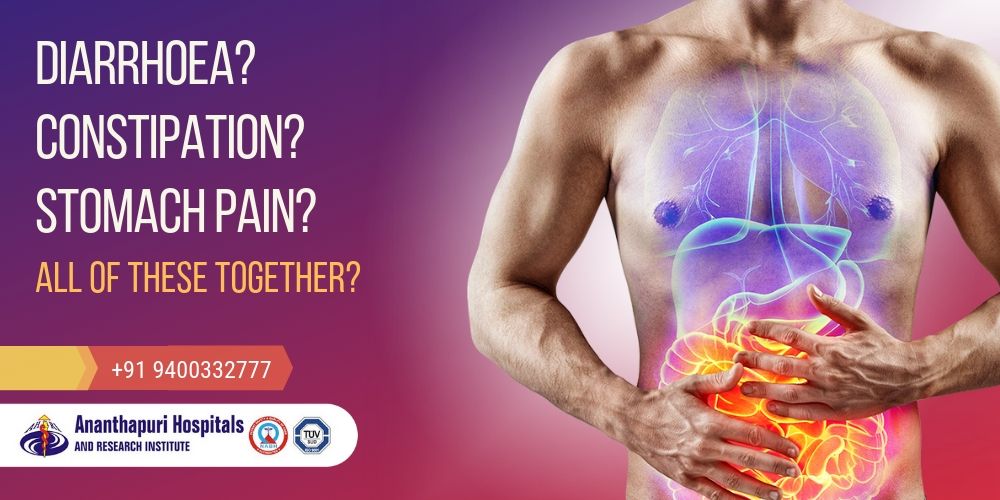- 01/July/2019

Irritable Bowel Syndrome - Symptoms, Treatment & Causes - Ananthapuri Hospitals
Irritable Bowel Syndrome (IBS), also called irritable bowel disease, is a combination of symptoms that occur together, including repeated abdominal pain and changes in your bowel movements, which could be diarrhoea, constipation, or both. IBS is a chronic condition that affects the large intestine. Most cases are usually mild and can be controlled with lifestyle and dietary modifications, and only a few patients experience severe symptoms. Adolescent and young adult women are most commonly affected by irritable bowel syndrome.
What are the symptoms of Irritable Bowel Syndrome?
Irritable Bowel Syndrome has three primary symptoms, including:
- Abdominal pain
- Altered bowel habits
- Abdominal bloating/distension, which is often caused by the presence of excess gas in the gut.
Other symptoms typically seen with IBS include:
- Presence of mucus in stool
- Heartburn and indigestion
- Worsening symptoms during menstrual flow
- Symptoms worsened by stress
- Vomiting and nausea
You should visit your doctor as soon as you can if you have any of the symptoms listed below. The presence of any of these symptoms suggests a more serious condition, such as cancer, affecting your intestines. These warning symptoms include:
- Sudden development of symptoms. Chronic, long standing symptoms are more consistent with Irritable bowel syndrome
- Worsening symptoms
- Symptoms are worse at nights
- Fever
- Persistent loss of appetite
- Weight loss
- Passage of blood, with or without stools, through the anus
- Greasy stools
- Difficulty swallowing
- Persistent abdominal pain, unrelieved by a bowel movement.
- Painful swallowing
What are the risk factors for Irritable Bowel Syndrome?
You are more likely to develop IBS if you:
- Are young as the condition typically occurs in adolescents and young adults, usually below the age of 45
- Have a member of your family with IBS because of the genetic susceptibility to the disease
- Have a psychological disorder, such as anxiety, depression, or a history of sexual, physical, or emotional abuse
What are the complications of Irritable Bowel Syndrome?
Complications of IBS include:
Reduced Quality of Life
The symptoms of IBS are long-term and may be debilitating, the condition distorts an individual’s daily functioning, impairing their performance at school and work.
Haemorrhoids
Chronic passage of hard stools may result in protrusion of the venous cushions in the walls of the anus, a condition called haemorrhoids.
Psychological Disorders
The recurrent discomfort and altered bowel habits associated with IBS may cause psychological complications including anxiety and depression.
How is Irritable Bowel Syndrome treated?
The treatment of irritable bowel syndrome consists of three principles: psychological therapy, dietary support, and symptomatic treatment with medicines.
Dietary Support
These are a few dietary measures you will have to take to treat irritable bowel syndrome:
- Have fibre-rich food as it improves the symptoms of altered bowel habit.
- Drink at least eight cups of fluid per day
- Limit your caffeine intake to three cups daily
- Reduce intake of legumes such as beans, lentils and cowpeas
- Reduce intake of carbonated beverages, such as soda
- Reduce alcohol intake
- Do not skip meals
- Have a regular eating pattern
- Reduced intake of foods with resistant starch, such as some nuts, grains, and legumes, as well as certain starchy foods including potatoes and rice after they have been cooked and have cooled
Psychological Therapy
Psychological therapy is aimed at relieving the psychological stressors or factors that exacerbate the symptoms of IBS. There have been several reports of improvement in IBS symptoms when concurrent psychological disorders are treated.
Relaxation techniques including exercises, yoga, meditation and other mindfulness exercises also help to relieve the symptoms of IBS.
Symptomatic Treatment
There is currently no cure for irritable bowel syndrome, so treatment focuses mainly on preventive and supportive measures. The doctor will recommend medicines that can relieve your symptoms.
---------------------------------------------------
If you experience abdominal pain or a combination of any of the symptoms mentioned above, consult a gastroenterologist immediately. To book an appointment, call us at +91 9400332777 or visit our hospital at Chacka, NH Bypass, Thiruvananthapuram.
Ananthapuri Advanced Centre for Gastrointestinal Diseases is a referral centre for patients across the globe. This centre has state of the art facilities for the early detection, diagnosis and treatment of complex gastrointestinal, liver and pancreatic diseases.

